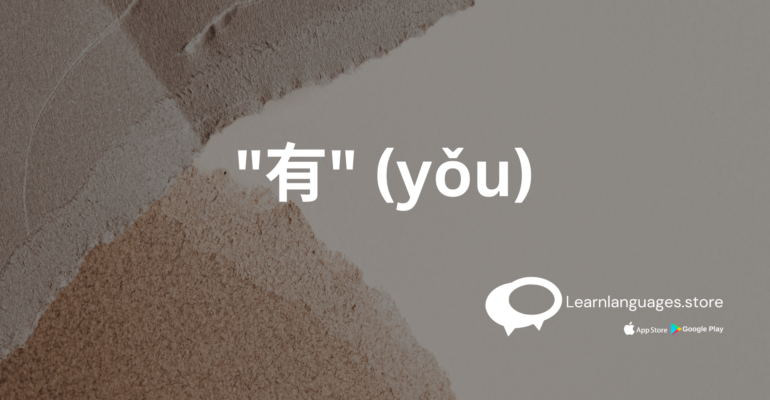Expressing Existence with “有” (yǒu)
Expressing Existence with “有” (yǒu)
Estimated reading time: 3 minutes

Level: A1 / HSK1
Keywords: 有 (yǒu)
Topic: Expressing Existence with “有” (yǒu)
Introduction
The verb 有 (yǒu), commonly meaning “to have,” can also be used to express existence in Chinese. Similar to saying “there is” or “there are” in English, 有 (yǒu) indicates the presence of something in a specific location. Let’s explore how to use 有 (yǒu) to describe the existence of objects or people in various places.
1. Basic Usage
Structure:
- Place + 有 + Object
This structure signifies that something exists or is present in a particular location.
Example Sentences:
- 我家有很多小狗。
(Wǒ jiā yǒu hěn duō xiǎo gǒu.)
- English: There are a lot of puppies in my home.
- Hindi: मेरे घर में बहुत सारे पिल्ले हैं।
(Mere ghar mein bahut saare pille hain.) - Humor: My home has so many puppies that it’s basically a doggy daycare.
- 我们学校有很多帅哥。
(Wǒmen xuéxiào yǒu hěn duō shuàigē.)
- English: There are a lot of cute guys in our school.
- Hindi: हमारे स्कूल में बहुत सारे सुंदर लड़के हैं।
(Hamaare school mein bahut saare sundar ladke hain.) - Humor: Our school has so many cute guys that we’re considering starting a fan club.
- 日本有很多中国人。
(Rìběn yǒu hěn duō Zhōngguó rén.)
- English: There are many Chinese people in Japan.
- Hindi: जापान में बहुत सारे चीनी लोग हैं।
(Japan mein bahut saare cheeni log hain.) - Humor: Japan has so many Chinese people that they should rename it “Chinapan.”
2. Asking Questions
Structure:
- Place + 有 + Object + 吗?
To inquire about the existence of something in a specific location, use the question format with 吗 (ma).
Example Sentences:
- 你家有牛奶吗?
(Nǐ jiā yǒu niúnǎi ma?)
- English: Is there milk in your house?
- Hindi: तुम्हारे घर में दूध है?
(Tumhaare ghar mein doodh hai?) - Humor: Is there milk in your house, or should I bring my own cow?
- 这里有一个问题。
(Zhèlǐ yǒu yī gè wèntí.)
- English: There is a problem here.
- Hindi: यहां एक समस्या है।
(Yahaan ek samasya hai.) - Humor: There is a problem here, but don’t worry, I’m an expert at causing them.
- 房间里有人吗?
(Fángjiān lǐ yǒu rén ma?)
- English: Is there anyone in the room?
- Hindi: क्या कमरे में कोई है?
(Kya kamre mein koi hai?) - Humor: Is there anyone in the room, or did I accidentally stumble into a ghost party?
3. Exceptions and Special Cases
While 有 (yǒu) is primarily used to indicate existence, it can also convey ownership or possession in certain contexts. For example:
- 我有一本书。(Wǒ yǒu yī běn shū.) – I have a book. In this case, 有 (yǒu) signifies possession rather than existence.
Learn Languages Store
Vashi,
Email: services@learnlanguages.store










